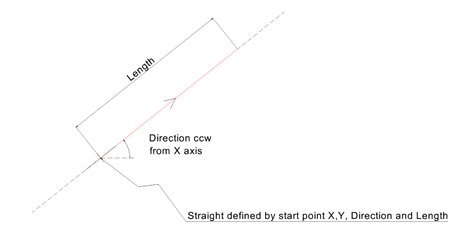Semantic definitions at the entity
Entity definition
The line segment is defined using the inherited start point, start distance and segment length parameter.
 |
Figure 261 — Line segment 2D |
| Item | SPF | XML | Change | Description | IFC4 ADD1 to IFC4x1 |
|---|---|---|---|---|
| IfcLineSegment2D | ADDED |
The line segment is defined using the inherited start point, start distance and segment length parameter.
 |
Figure 261 — Line segment 2D |

| # | Attribute | Type | Cardinality | Description | B |
|---|---|---|---|---|---|
| IfcRepresentationItem | |||||
| StyledByItem | IfcStyledItem @Item | S[0:1] | Reference to the IfcStyledItem that provides presentation information to the representation, e.g. a curve style, including colour and thickness to a geometric curve. | X | |
| IfcGeometricRepresentationItem | |||||
| IfcCurve | |||||
| Dim :=IfcCurveDim(SELF) | IfcDimensionCount | [1:1] | The space dimensionality of this abstract class, defined differently for all subtypes, i.e. for IfcLine, IfcConic and IfcBoundedCurve. | X | |
| IfcBoundedCurve | |||||
| IfcCurveSegment2D | |||||
| 1 | StartPoint | IfcCartesianPoint | [1:1] | The start point of the 2D curve as x/y coordinates defined by a 2D Cartesian point. | X |
| 2 | StartDirection | IfcPlaneAngleMeasure | [1:1] | The direction of the tangent at the start point. Direction value 0. indicates a curve with a start tangent along the positive x-axis. Values increases counter-clockwise, and decreases clockwise. Depending on the plane angle unit, either degree or radians, the sensible range is -360° ≤ n ≤ 360° (or -2π ≤ n ≤ 2π). Values larger then a full circle (>|360°| or >|2 π| shall not be used. | X |
| 3 | SegmentLength | IfcPositiveLengthMeasure | [1:1] | The length along the curve | X |
| IfcLineSegment2D | |||||
<xs:element name="IfcLineSegment2D" type="ifc:IfcLineSegment2D" substitutionGroup="ifc:IfcCurveSegment2D" nillable="true"/>
<xs:complexType name="IfcLineSegment2D">
<xs:complexContent>
<xs:extension base="ifc:IfcCurveSegment2D"/>
</xs:complexContent>
</xs:complexType>
ENTITY IfcLineSegment2D
SUBTYPE OF (IfcCurveSegment2D);
END_ENTITY;